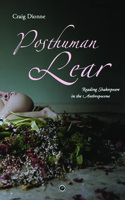Posthuman Lear: Reading Shakespeare in the Anthropocene
Author(s)
Dionne, Craig
Collection
ScholarLedLanguage
EnglishAbstract
Approaching King Lear from an eco-materialist perspective, Posthuman Lear examines how the shift in Shakespeare’s tragedy from court to stormy heath activates a different sense of language as tool-being — from that of participating in the flourish of aristocratic prodigality and circumstance, to that of survival and pondering one’s interdependence with a denuded world. Dionne frames the thematic arc of Shakespeare’s tragedy about the fall of a king as a tableaux of our post-sustainable condition. For Dionne, Lear’s progress on the heath works as a parable of flat ontology. At the center of Dionne’s analysis of rhetoric and prodigality in the tragedy is the argument that adages and proverbs, working as embodied forms of speech, offer insight into a nonhuman, fragmentary mode of consciousness. The Renaissance fascination with memory and proverbs provides an opportunity to reflect on the human as an instance of such enmeshed being where the habit of articulating memorized patterns of speech works on a somatic level. Dionne theorizes how mnemonic memory functions as a potentially empowering mode of consciousness inherited by our evolutionary history as a species, revealing how our minds work as imprinted machines to recall past prohibitions and useful affective scripts to aid in our interaction with the environment. The proverb is that linguistic inscription that defines the equivalent of human-animal imprinting, where the past is etched upon collective memory within ‘adagential” being that lives on through the generations as autonomic cues for survival.
Keywords
posthumanism; William Shakespeare; literary criticism; anthropoceneDOI
10.21983/P3.0133.1.00ISBN
9780692641576OCN
1048244289Publisher
punctum booksPublisher website
https://punctumbooks.com/Publication date and place
Brooklyn, NY, 2016Classification
Literary studies: general


 Download
Download